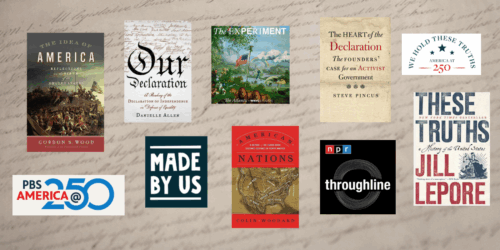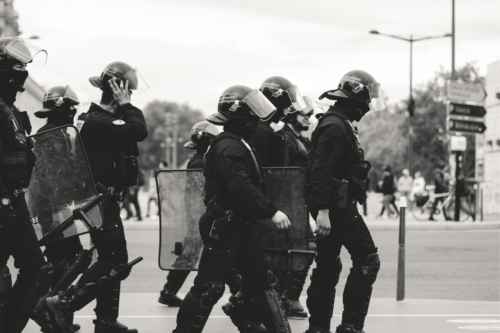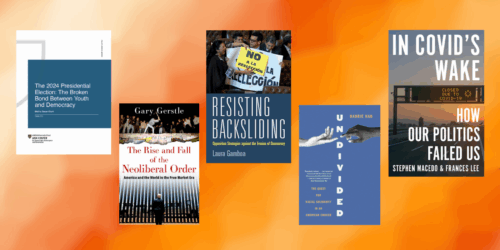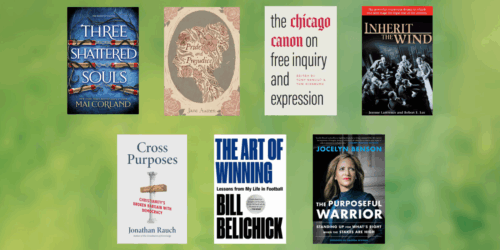The attempted assassination of Donald Trump has stoked Americans’ fears of rising political violence across the country. It is no longer an aberration; in recent years, it has impacted people at every level of the political process, from the President to Congress to poll workers. While the vast majority of the population, across the political spectrum, reject political violence entirely, “a number of different polls have come out in recent years, in recent months, suggesting growing anxiety about political violence in general, with some polls reporting modest increases in the proportion of respondents who would tolerate or even condone political violence against members of the opposing party,” shares host Erica Chenoweth, academic dean for faculty engagement and Frank Stanton Professor of the First Amendment at Harvard Kennedy School. “Since the COVID-19 pandemic, America has witnessed an era of political violence unparalleled since at least the 1960s,” they added, quoting political scientist Robert Pape.
In the wake of this most recent incident, the Ash Center convened a panel of experts to discuss Americans’ attitudes toward political violence and explore strategies for counteracting and de-escalating future violent acts to prevent them from becoming an accepted social norm.
The following excerpts, edited for clarity and length, are taken from the remarks of the speakers:
The threat of political violence is just as detrimental to the American psyche as the violent events themselves.
“Threats are, right now in my view, doing most of the damage for a country of 330 million people thereabouts. The actual incident of physical political violence is relatively small depending on how we define the term.”
— Hardy Merriman, President, International Center on Nonviolent Conflict; Author of “Harnessing Our Power to End Political Violence (HOPE)”
“Turnout tends to be lower when people fear that the elections might be violent, when they fear it wouldn’t be safe for them to go out and vote … Even if they don’t think they would actually be hurt, they are deterred from voting if there’s a violent atmosphere surrounding the election.”
— Sarah Birch, Professor of Political Science at King’s College London and author of Electoral Violence, Corruption, and Political Order
“The First Amendment protects lots of scary things that you can say and do to legitimately affect the political behavior of officials, businesses, citizens … of all kinds of folks. So, the threats have skyrocketed.”
— Merriman
How we talk about political violence plays a vital role in shaping public sentiment around safety.
“To quell anxieties, it’s important that we also communicate that many communities won’t be at increased risk because we know from other studies that political violence tends to be quite localized.”
— Birch
“It’s so important not to minimize what’s going on, but also to keep a healthy perspective relative to the fact that people overwhelmingly reject political violence and that, in general in our country, people have been able to vote safely, especially relative to many other places in the world.”
— Erica Chenoweth
“Political violence is an act of desperation. It’s the loser’s gambit. It’s what you do when you’re not winning the argument, the national conversation. I think that rather than cover violence as this sort of breathless, very frightening thing, we want to reframe and think of it more as this was a desperate act.”
— Lilliana Mason, Associate Professor at Johns Hopkins University, Co-author of “Radical American Partisanship: Mapping Violent Hostility, Its Causes, and the Consequences for American Democracy”
“I think it’s important to begin to reframe this problem, not just as a threat maker and a person who is targeted but also build a narrative that incitement is a key part of this. And the inciters don’t get off the hook … they get to profit the most from their work, and then can simultaneously distance themselves from the actual threat.”
— Merriman
Liliana Mason explains that combating political violence requires strong leadership.
“Most of our data has shown that it’s very easy for leaders to reduce approval of violence. It’s quite simple, all they have to do is say, ‘Don’t do that.’
… We have the power to change Americans’ attitudes about political violence if our leaders are willing to do the responsible thing and provide leadership that keeps our democracy functioning peacefully … Leadership is extraordinarily important. We want responsible leaders who provide an example of how to be a member of a democracy for people who support them or not. But the problem with that is that we can’t control our leaders.”
Condemning political violence is a group effort.
“At the very least, we need to agree that violence isn’t the way that we’re going to get things done. No matter how much you may politically disagree with your neighbor, chances are they agree that violence is not acceptable too, and it is not how they want to get things done in this country”
— Merriman
“A community that will tolerate violence will get violence. A community that does not tolerate violence is much less likely to have violence. And I think it is down to every single citizen to condemn violence and to talk in such a way that makes it unacceptable.”
— Birch
“Our strength is in finding each other. Our strength is in our [allies], of which there are many, and we all have skills and networks to which we can contribute … There’s enormous power to tap into, and it depends on our unity, it depends on our strategy, it depends on our ability to make political violence backfire,”
— Merriman




